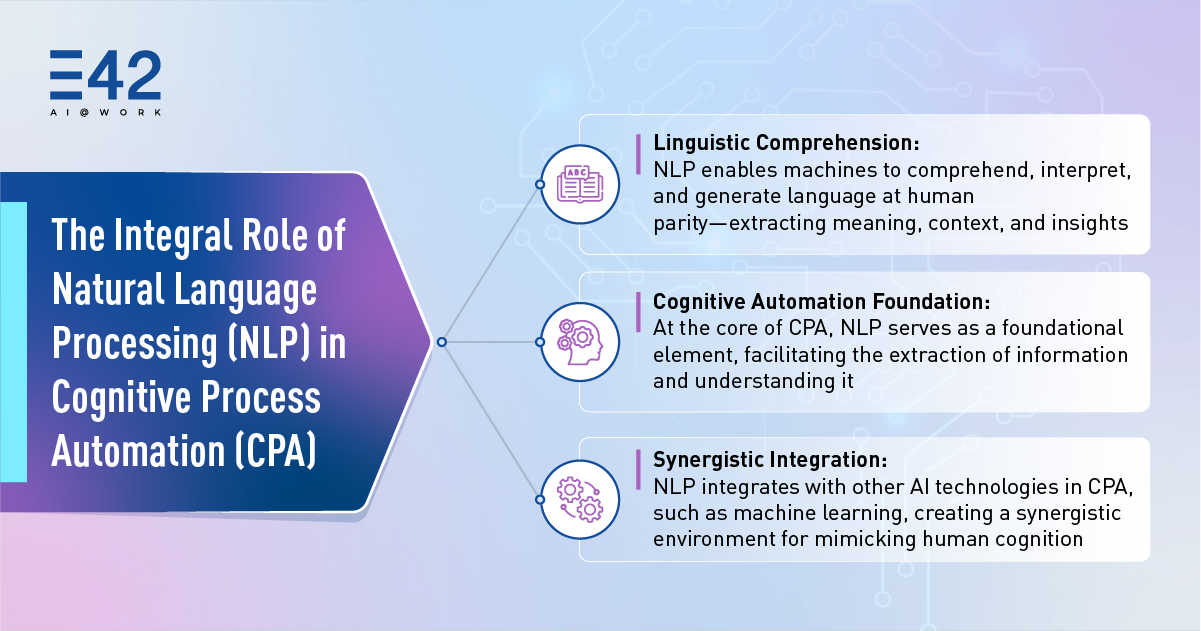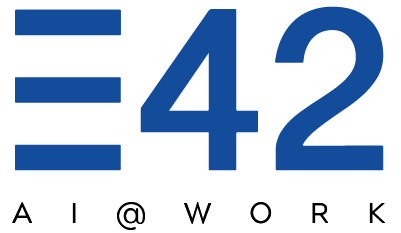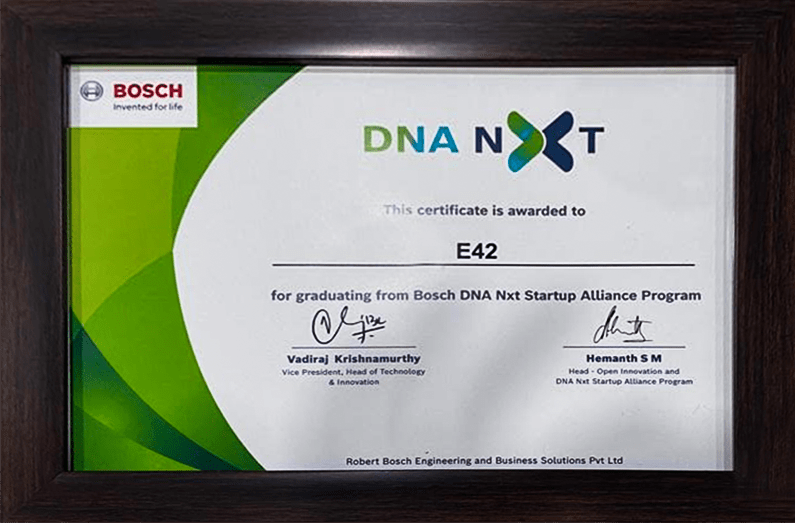In the dynamic landscape of artificial intelligence (AI), the convergence of two potent technologies, Natural Language Processing (NLP) and Cognitive Process Automation (CPA) marks a paradigm shift in how machines interact with human language and streamline intricate business processes. This blog post is a deep dive into the significance of NLP within CPA, navigating through its fundamental concepts, real-world applications, and the transformative synergy between these cutting-edge technologies.
Here’s what this article covers:
A Thorough Understanding of Natural Language Processing
Components of Natural Language Processing: The Linguistic Gateway to Machines
At its essence, Natural Language Processing is an interdisciplinary field of AI striving to equip machines with the ability to comprehend, interpret, and generate language at human parity. The journey unfolds with syntactic parsing, analyzing the grammatical structure of sentences, and semantic analysis, extracting meaning and context. NLP extends its prowess to contextual understanding, unraveling the subtle nuances embedded in human communication.
Realizing the Potential of NLP in Text and Sentiment Analysis
NLP transcends language comprehension by engaging in text and sentiment analysis. Through advanced techniques like tokenization and part-of-speech tagging, it dissects textual content, offering a granular understanding of unstructured data. Sentiment analysis, a critical facet, enables machines to discern emotional tones within text, a capability vital for gauging user sentiments and preferences.
Insight Extraction: Unveiling the Power of NLP
One of the triumphs of Natural Language Processing lies in its ability to navigate through intricate documents and employ semantic approaches to extract meaningful insights from data. This capability positions NLP as a versatile tool for businesses seeking actionable intelligence from the vast sea of structured and unstructured data.
Integration with Other AI Technologies
Within the realm of Cognitive Process Automation (CPA), the fusion of Natural language processing, machine learning, and other cutting-edge AI technologies extends beyond mere coexistence; it forms a symbiotic relationship with broader AI frameworks. This intricate collaboration lays the foundation for the development of advanced AI assistants or AI co-workers that transcend conventional automation boundaries. By seamlessly integrating NLP, machine learning, computer vision, and predictive analytics, these AI co-workers become multifaceted entities. Machine learning algorithms contribute to the continuous improvement of their performance by learning from data patterns, adapting to changing circumstances, and refining their decision-making abilities over time.
The incorporation of computer vision technologies empowers these AI co-workers to interpret and interact with visual data, broadening the scope of tasks they can undertake. This amalgamation does not merely streamline processes; it propels organizations into an era where data-driven decision-making is not just a concept but a tangible and integral part of operations.

The Mathematics Behind Natural Language Processing
NLP is deeply rooted in mathematics and statistics, adding a layer of sophistication to its operations. It leverages concepts from linear algebra, calculus, and probability theory to process and analyze text data. Let’s break down the mathematical underpinnings:
- Bag of Words (BoW) Model: Represents text data as vectors in a high-dimensional space.
- TF-IDF (Term Frequency-Inverse Document Frequency): Assigns importance to words based on their frequency in a document and across a corpus.
Imagine text data as a puzzle, and each word as a unique piece. Natural language processing uses mathematical tools to assemble these pieces into a coherent picture, extracting patterns and meanings from seemingly chaotic arrangements. It’s akin to the art of deciphering a cryptic message hidden within the language labyrinth.
Natural language processing plays a pivotal role in Intelligent Document Processing (IDP), revolutionizing data extraction, categorization, and analysis from unstructured text sources. By deciphering and understanding the nuances of human language, NLP facilitates the automation of document-centric workflows, reducing manual efforts and improving overall operational efficiency. In the realm of Conversational AI, NLP serves as the backbone for virtual assistants, chatbots, and voice-activated systems, enabling fluid and human-like interactions between users and machines. These applications enhance customer service, streamline information retrieval, and facilitate efficient task execution.
Understanding Cognitive Process Automation
Cognitive Process Automation is an advanced form of automation that leverages AI technologies like NLP, machine learning, and deep learning to automate tasks that require human-like perception, judgment, and interaction. CPA goes beyond rule-based automation by learning from data, understanding context, making decisions, and improving over time. Let’s delve into the intricacies of CPA, unraveling its technical nuances:
- NLP Integration: At the core of CPA is the integration of Natural language processing, enabling systems to comprehend and interact with human language in a nuanced manner. NLP facilitates the extraction of meaning, context, and insights from textual data, laying the foundation for cognitive automation.
- Machine Learning Frameworks: CPA leverages machine learning algorithms to go beyond rule-based automation. These algorithms learn from vast datasets, discern patterns, and adapt their behavior based on the information they process. This dynamic learning capability is fundamental to achieving a level of automation that mirrors human-like decision-making.
- Deep Learning Architectures: Deep learning, a subset of machine learning, empowers CPA with the ability to automatically learn hierarchical representations of data. Deep learning architectures leverage neural networks to emulate the intricate structure and operations of the human brain, amplifying the system’s capabilities in perception and decision-making.
- Informed Decision-Making: Unlike rule-based automation, CPA is capable of informed decision-making. Machine Learning algorithms analyze data, identify patterns, and enable the system to make decisions based on the learned insights. This adaptive decision-making process enhances the system’s capability to handle complex and evolving scenarios.
- Iterative Enhancement: CPA operates on an iterative model of enhancement. As it encounters new data and scenarios, the system iteratively improves its performance, fine-tuning its algorithms for greater accuracy and efficiency. This continuous improvement is a hallmark of cognitive automation.
Conclusion
In this intricate dance between technology and cognition, NLP in automation emerges as a linguistic maestro, unraveling the layers of human language for machines to comprehend. Its integration into the fabric of CPA propels us into a future where automation not only mirrors but amplifies human thought processes. As we navigate this landscape of limitless possibilities, the transformative synergy of NLP and CPA stands as a testament to the evolving saga of artificial intelligence, where understanding and interpreting human language are the keystones to decoding the future.
Make your Enterprise Intelligent with E42
E42 is a no-code Cognitive Process Automation (CPA) platform to create multifunctional AI co-workers that automate enterprise functions across verticals and domains ranging from automobiles and BFSI to telecom, manufacturing, and more. By maximizing efficiency and scalability, and minimizing the human workload, E42 is disrupting the enterprise automation space to deliver a hassle-free user experience. To kickstart your enterprise automation journey, write to us at interact@e42.ai!



